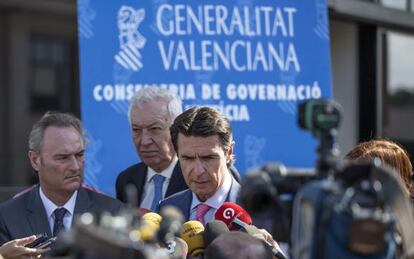Gas-storage project will not restart until “safety guaranteed,” says minister
José Manuel Soria makes visit to plant, which is thought to have caused earth tremors

The minister for industry, energy and tourism, José Manuel Soria, said on Tuesday that the government has no plans as of yet to close the Castor gas-storage plant, which is suspected of being the cause of a wave of seismic activity that has affected coastal towns in Tarragona and Castellón provinces in recent weeks.
After making a visit to the plant, which is located off the coast of Vinaròs (Castellón), Soria relayed the conclusions of the company in charge of the project, which works by storing gas in a depleted oil field located 1,800 meters below sea level. Experts from the company, the minister explained, “do see a direct relationship” with the injection of gas into the oil field with the tremors that measure below three on the Richter scale, but earthquakes that are greater than that “would be due to the movement of a fault.” The plant is in fact constructed on a fault line, named Amposta, but Soria said that the experts did not think the seismic activity was originating there.
The minister said that he was not going to give the official version of the cause of the tremors, which have alarmed local residents, until a full report from the Spanish Geological and Mining Institute is complete. Soria went on to say on Tuesday that there would “be no authorization to restart the activity” of the storage plant, until there is a “convincing report” containing “clear guarantees for the safety of citizens.” He added that he did not know when this report would be complete.
Asked about who would cover the costs of the Castor plant, should the decision be made to close the project for good, Soria reiterated that the ministry is not even considering that option for now.
However, the company that is in charge of the project, Escal UGS, has no doubts about who would have to pick up the tab should the project be halted. “If the installation is closed down, the ministry would assume the complete audited cost,” sources from the company say.
The plant has so far cost 1.3 billion euros to build, which is tens or hundreds of thousands more than the original budget, according to a variety of sources. Despite being run by a private company, the project was put in motion by the government, as a way to cover 30 to 40 percent of Spain’s daily demand of natural gas for a period of up to 50 days. The objective is to cover peaks of consumption or interruptions to supply.
According to the laws covering such projects, should the government “request the [revocation of the license] within 25 years of it being granted, the investment in the installation will be recognized.” That means that the government would be liable to cover the cost of the project up to the moment that it was closed.
Tu suscripción se está usando en otro dispositivo
¿Quieres añadir otro usuario a tu suscripción?
Si continúas leyendo en este dispositivo, no se podrá leer en el otro.
FlechaTu suscripción se está usando en otro dispositivo y solo puedes acceder a EL PAÍS desde un dispositivo a la vez.
Si quieres compartir tu cuenta, cambia tu suscripción a la modalidad Premium, así podrás añadir otro usuario. Cada uno accederá con su propia cuenta de email, lo que os permitirá personalizar vuestra experiencia en EL PAÍS.
¿Tienes una suscripción de empresa? Accede aquí para contratar más cuentas.
En el caso de no saber quién está usando tu cuenta, te recomendamos cambiar tu contraseña aquí.
Si decides continuar compartiendo tu cuenta, este mensaje se mostrará en tu dispositivo y en el de la otra persona que está usando tu cuenta de forma indefinida, afectando a tu experiencia de lectura. Puedes consultar aquí los términos y condiciones de la suscripción digital.








































